23 feb 2019
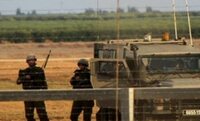
Israeli forces opened fire towards Palestinian shepherds, on Saturday morning, in the besieged Gaza Strip.
Witnesses told a Ma'an reporter said that Israeli forces opened fire, targeting Palestinian shepherds herding their sheep in the Malaka area in the eastern Gaza Strip.
No injuries were reported.
The Israeli army also regularly detains and opens fire on unarmed Palestinian fishermen, shepherds, and farmers along the border areas if they approach the buffer zone, as the authorities have not made clear the precise area of the designated zone.
The practice has in effect destroyed much of the agricultural and fishing sector of the blockaded coastal enclave, which has been under an Israeli air, land, and sea blockade for nearly 12 years.
Witnesses told a Ma'an reporter said that Israeli forces opened fire, targeting Palestinian shepherds herding their sheep in the Malaka area in the eastern Gaza Strip.
No injuries were reported.
The Israeli army also regularly detains and opens fire on unarmed Palestinian fishermen, shepherds, and farmers along the border areas if they approach the buffer zone, as the authorities have not made clear the precise area of the designated zone.
The practice has in effect destroyed much of the agricultural and fishing sector of the blockaded coastal enclave, which has been under an Israeli air, land, and sea blockade for nearly 12 years.
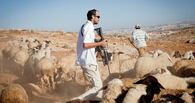
Israeli soldiers abducted, on Saturday evening, three Palestinian shepherds, south of Yatta town, south of Hebron, in the southern part of the occupied West Bank.
Rateb Jabour, the coordinator of the National and Popular Committee against the Annexation Wall and Colonies in southern West Bank, said the soldiers, accompanied by many colonialist settlers, invaded the area, before the army detained the shepherds.
He added that the three shepherds are from Abu Younis and al-Jabarin families and stated that the soldiers released them later.
Jabour said that the colonists have escalated their violations in the area, and have been frequently attacking Palestinian farmers and shepherds, in addition to trying to prevent them from entering their own lands.
It is worth mentioning that the colonists have occupied a Palestinian hill, west of the adjacent Jibna village, and have been preventing the Palestinian owners of the lands, and the shepherds, from entering it.
Rateb Jabour, the coordinator of the National and Popular Committee against the Annexation Wall and Colonies in southern West Bank, said the soldiers, accompanied by many colonialist settlers, invaded the area, before the army detained the shepherds.
He added that the three shepherds are from Abu Younis and al-Jabarin families and stated that the soldiers released them later.
Jabour said that the colonists have escalated their violations in the area, and have been frequently attacking Palestinian farmers and shepherds, in addition to trying to prevent them from entering their own lands.
It is worth mentioning that the colonists have occupied a Palestinian hill, west of the adjacent Jibna village, and have been preventing the Palestinian owners of the lands, and the shepherds, from entering it.
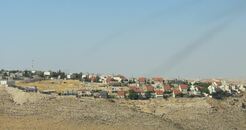
Palestinian citizens on Friday managed to ward off extremist Jewish settlers after they attacked their plots of agricultural land in Beit Ta'mir village, southeast of Bethlehem in the occupied West Bank.
According to a local official, local residents of Beit Ta’mir confronted settlers who infiltrated their lands and forced them to leave.
The same settlers also cultivated a Palestinian-owned tract of land near the illegal settlement of Nokdim. The land belong to the family of al-Zawahra.
According to a local official, local residents of Beit Ta’mir confronted settlers who infiltrated their lands and forced them to leave.
The same settlers also cultivated a Palestinian-owned tract of land near the illegal settlement of Nokdim. The land belong to the family of al-Zawahra.
22 feb 2019
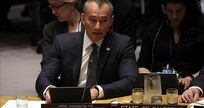
Nickolay Mladenov, the UN special coordinator for the Middle East peace process, has said that the UN continues its efforts to implement the package of urgent humanitarian and economic interventions in Gaza called for at the September meeting in New York.
In his recent briefing to the Security Council, Mladenov stated that Qatar had donated an additional USD 20 million to expand the UN cash-for-work program in Gaza, adding that such donation would create some 10,000 new temporary jobs in Gaza.
He also said the World Bank also launched its USD 17 million cash-for-work program which would create another 5,000 temporary jobs in Gaza.
“The Palestinian people,” he continued, “need the support of the international community more than ever, as a range of issues are exerting a heavy toll on those living in Gaza and the West Bank. These include ongoing violence, the lack of progress towards peace, financial pressures and unilateral measures by the Government of Israel.”
Mladenov cited a recent decision by Israel to withhold some $140 million in Palestinian tax revenue transfers (the equivalent of money paid to Palestinian prisoners, and their families), and the decision of the US government to halt funding for UNRWA as factors driving financial instability in the occupied Palestinian territories.
In his recent briefing to the Security Council, Mladenov stated that Qatar had donated an additional USD 20 million to expand the UN cash-for-work program in Gaza, adding that such donation would create some 10,000 new temporary jobs in Gaza.
He also said the World Bank also launched its USD 17 million cash-for-work program which would create another 5,000 temporary jobs in Gaza.
“The Palestinian people,” he continued, “need the support of the international community more than ever, as a range of issues are exerting a heavy toll on those living in Gaza and the West Bank. These include ongoing violence, the lack of progress towards peace, financial pressures and unilateral measures by the Government of Israel.”
Mladenov cited a recent decision by Israel to withhold some $140 million in Palestinian tax revenue transfers (the equivalent of money paid to Palestinian prisoners, and their families), and the decision of the US government to halt funding for UNRWA as factors driving financial instability in the occupied Palestinian territories.
21 feb 2019
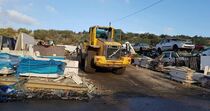
The Israeli occupation forces notified on Thursday a Palestinian farmer from Idna town, west of al-Khalil city, in the southern occupied West Bank, of their decision to demolish his agricultural structures.
Sources at Idna municipality said that Israeli forces handed Taysir Etmeizy a demolition notice targeting his agricultural premises in the town.
Hundreds of demolition notices have recently been handed over to Palestinians in Idna, in what the locals say is an attempt by the Israeli occupation authorities and military to force them out of the area and expand the apartheid wall at the expense of thousands of dunums of Palestinian lands in and around Idna.
Sources at Idna municipality said that Israeli forces handed Taysir Etmeizy a demolition notice targeting his agricultural premises in the town.
Hundreds of demolition notices have recently been handed over to Palestinians in Idna, in what the locals say is an attempt by the Israeli occupation authorities and military to force them out of the area and expand the apartheid wall at the expense of thousands of dunums of Palestinian lands in and around Idna.
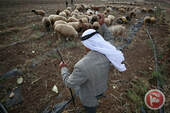
Israeli settlers attacked Palestinian shepherds and prevented them from herding their flocks of sheep, on Thursday, in Tarami area, south of the southern occupied West Bank district of Hebron.
According to local sources, Israeli settlers, under the heavy protection of Israeli forces, stormed an open field in the Tarami area and attacked two shepherds by repeatedly beating them.
Sources added that the two shepherds are from Mur family, noting they had suffered bruises and various cuts from the attack.
Sources stressed the increase of Israeli attacks against Palestinian residents and shepherds in southern Hebron, particularly in the Masafer Yatta area, where settlers prevent shepherds and farmers from reaching their lands and herding their livestock.
The Palestinian government has no jurisdiction over Israelis in the West Bank, and acts carried out by Israeli settlers often occur in the presence of Israeli military forces who rarely act to protect Palestinian residents.
According to a report by the Israeli rights group B'Tselem, "Settler violence and vandalism takes place with full backing by the Israeli authorities.
Sometimes soldiers take part in the assault; at other times, they stand idly by. The police makes no substantial effort to investigate the incidents, nor takes measures to prevent them or stop them in real time."
According to local sources, Israeli settlers, under the heavy protection of Israeli forces, stormed an open field in the Tarami area and attacked two shepherds by repeatedly beating them.
Sources added that the two shepherds are from Mur family, noting they had suffered bruises and various cuts from the attack.
Sources stressed the increase of Israeli attacks against Palestinian residents and shepherds in southern Hebron, particularly in the Masafer Yatta area, where settlers prevent shepherds and farmers from reaching their lands and herding their livestock.
The Palestinian government has no jurisdiction over Israelis in the West Bank, and acts carried out by Israeli settlers often occur in the presence of Israeli military forces who rarely act to protect Palestinian residents.
According to a report by the Israeli rights group B'Tselem, "Settler violence and vandalism takes place with full backing by the Israeli authorities.
Sometimes soldiers take part in the assault; at other times, they stand idly by. The police makes no substantial effort to investigate the incidents, nor takes measures to prevent them or stop them in real time."
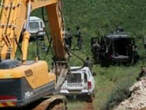
Israeli soldiers invaded, on Wednesday invaded the ar-Raheela area, east of Yatta town, south of the southern West Bank city of Hebron, before confiscating a trench roller and a bulldozer.
Rateb Jabour, the coordinator of the National and Popular Committees against the Annexation Wall and Colonies in southern West Bank, said the soldiers confiscated the two machines, and took them to their military base.
Jabour added that the trench roller and the bulldozer are owned by a local man, identified as Mahfouth Rashid.
The Israeli army has been preventing the Palestinian from paving or preparing roads, including agricultural roads in the area, to occupy more Palestinian lands for “military purposes,” and for its illegal colonialist activities.
Rateb Jabour, the coordinator of the National and Popular Committees against the Annexation Wall and Colonies in southern West Bank, said the soldiers confiscated the two machines, and took them to their military base.
Jabour added that the trench roller and the bulldozer are owned by a local man, identified as Mahfouth Rashid.
The Israeli army has been preventing the Palestinian from paving or preparing roads, including agricultural roads in the area, to occupy more Palestinian lands for “military purposes,” and for its illegal colonialist activities.
20 feb 2019
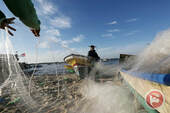
Israeli naval forces opened fire at Palestinian fishing boats off the coast of Gaza City and the northern besieged Gaza Strip, on Wednesday morning.
A Ma'an reporter said that Israeli war boats simultaneously opened fire at Palestinian fishermen off the coast of Gaza City and the northern Gaza Strip.
No injuries were reported.
Sources pointed out that shots were fired in the allowed fishing zone.
The Israeli army also regularly detains and opens fire on unarmed Palestinian fishermen, shepherds, and farmers along the border areas if they approach the buffer zone, as the authorities have not made clear the precise area of the designated zone.
The practice has in effect destroyed much of the agricultural and fishing sector of the blockaded coastal enclave, which has been under an Israeli air, land, and sea blockade for 10 years.
A Ma'an reporter said that Israeli war boats simultaneously opened fire at Palestinian fishermen off the coast of Gaza City and the northern Gaza Strip.
No injuries were reported.
Sources pointed out that shots were fired in the allowed fishing zone.
The Israeli army also regularly detains and opens fire on unarmed Palestinian fishermen, shepherds, and farmers along the border areas if they approach the buffer zone, as the authorities have not made clear the precise area of the designated zone.
The practice has in effect destroyed much of the agricultural and fishing sector of the blockaded coastal enclave, which has been under an Israeli air, land, and sea blockade for 10 years.
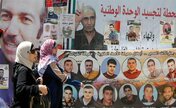
Israel said that its security cabinet, on Sunday, decided to withhold $138 million (€122 million) in tax transfers to the Palestinian Authority, over its payments to prisoners jailed for attacks on Israelis.
A statement from Prime Minister Benjamin Netanyahu’s office said the withheld cash would be equal to that paid by the PA last year to “terrorists imprisoned in Israel, to their families and to released prisoners.”
Israel alleges the payments encourage further violence, AFP/Al Ray reports.
The PA says the payments are a form of welfare to the families who have lost their main breadwinner and denies it is seeking to encourage violence.
Many Palestinians view prisoners, and those killed while carrying out attacks, as heroes in their conflict with Israel. Palestinian leaders often venerate them as martyrs.
Senior Palestine Liberation Organisation official Ahmed Majdalani accused Israel and the United States, which has cut hundreds of millions of dollars in Palestinian aid, of an attempt at blackmail.
US President Donald Trump’s White House is expected to release its long-awaited peace plan, later this year, and that the Palestinians believe will be blatantly biased in favor of Israel.
The Palestinians cut off contact with the White House after Trump’s 2017 declaration of Jerusalem as Israel’s capital.
“The occupation government is seeking to destroy the national authority in partnership with the US administration of Donald Trump,” Majdalani said, in a statement.
US AID CUTS
The move to withhold the money comes in response to an Israeli law passed last year allowing it to do so.
Israel collects around US$127 million a month in customs duties levied on goods destined for Palestinian markets that transit through Israeli ports, and then transfers the money to the PA.
Earlier this month, Netanyahu pledged to implement the law after a deadly Palestinian attack on a young woman.
He is running in an election scheduled for Apr 9, and has been seeking to shore up his security credentials in the eyes of voters, ahead of polling day.
Earlier on Sunday, Netanyahu said, “Today, I will submit for cabinet approval the (legislation on) deducting of the terrorists’ salaries from the Palestinian Authority funds.
“Security officials will brief the cabinet on the scope of the funds. This is an important law which we have advanced, and today we will pass it exactly as I promised.”
The US$138 million will likely be deducted incrementally over a 12-month period, according to local media reports.
Sponsors of the July law on Palestinian funds wrote, at the time, that the PA paid around US$330 million a year to prisoners and their families, or seven percent of its budget.
It was not clear what caused the reduction in the amount.
The Palestinians have already been facing a cut of more than US$500 million in annual aid, by Trump’s administration, mostly to the UN agency for Palestinian refugees.
The Palestinian Authority also said, in January, that it will refuse all further US government aid for fear of lawsuits over alleged support for terrorism, due to a recently passed US law.
Israel has withheld payments in the past, notably in response to the Palestinians’ 2011 admission to the UN cultural agency UNESCO as a full member.
The PA, which has limited sovereignty in parts of the occupied West Bank, relies heavily on outside financial aid.
A statement from Prime Minister Benjamin Netanyahu’s office said the withheld cash would be equal to that paid by the PA last year to “terrorists imprisoned in Israel, to their families and to released prisoners.”
Israel alleges the payments encourage further violence, AFP/Al Ray reports.
The PA says the payments are a form of welfare to the families who have lost their main breadwinner and denies it is seeking to encourage violence.
Many Palestinians view prisoners, and those killed while carrying out attacks, as heroes in their conflict with Israel. Palestinian leaders often venerate them as martyrs.
Senior Palestine Liberation Organisation official Ahmed Majdalani accused Israel and the United States, which has cut hundreds of millions of dollars in Palestinian aid, of an attempt at blackmail.
US President Donald Trump’s White House is expected to release its long-awaited peace plan, later this year, and that the Palestinians believe will be blatantly biased in favor of Israel.
The Palestinians cut off contact with the White House after Trump’s 2017 declaration of Jerusalem as Israel’s capital.
“The occupation government is seeking to destroy the national authority in partnership with the US administration of Donald Trump,” Majdalani said, in a statement.
US AID CUTS
The move to withhold the money comes in response to an Israeli law passed last year allowing it to do so.
Israel collects around US$127 million a month in customs duties levied on goods destined for Palestinian markets that transit through Israeli ports, and then transfers the money to the PA.
Earlier this month, Netanyahu pledged to implement the law after a deadly Palestinian attack on a young woman.
He is running in an election scheduled for Apr 9, and has been seeking to shore up his security credentials in the eyes of voters, ahead of polling day.
Earlier on Sunday, Netanyahu said, “Today, I will submit for cabinet approval the (legislation on) deducting of the terrorists’ salaries from the Palestinian Authority funds.
“Security officials will brief the cabinet on the scope of the funds. This is an important law which we have advanced, and today we will pass it exactly as I promised.”
The US$138 million will likely be deducted incrementally over a 12-month period, according to local media reports.
Sponsors of the July law on Palestinian funds wrote, at the time, that the PA paid around US$330 million a year to prisoners and their families, or seven percent of its budget.
It was not clear what caused the reduction in the amount.
The Palestinians have already been facing a cut of more than US$500 million in annual aid, by Trump’s administration, mostly to the UN agency for Palestinian refugees.
The Palestinian Authority also said, in January, that it will refuse all further US government aid for fear of lawsuits over alleged support for terrorism, due to a recently passed US law.
Israel has withheld payments in the past, notably in response to the Palestinians’ 2011 admission to the UN cultural agency UNESCO as a full member.
The PA, which has limited sovereignty in parts of the occupied West Bank, relies heavily on outside financial aid.
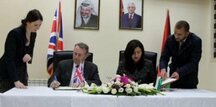
A trade continuity agreement will see Palestinian businesses and consumers benefiting from continued trade, after the UK leaves the European Union, UK International Trade Secretary Dr Liam Fox said, on Monday.
In Ramallah, the UK-Palestinian Authority agreement was signed by both the International Trade Secretary and Her Excellency, Abeer Odeh, Minister of National Economy.
The agreement simplifies trade and will allow businesses to trade as freely, as they do now, once the UK leaves the EU.
Trading on these preferential terms, rather than on World Trade Organization terms, will continue to deliver significant savings and help to further strengthen the bilateral trading relationship.
The agreement allows Palestinian businesses to continue access the UK market tariff-free which will continue to benefit Palestinian producers in priority sectors, including exporters of fruit, nuts and vegetable fats including dates and olive oil.
The UK is seeking to provide continuity for around 40 existing EU trade agreements covering more than 70 countries, PNN further reports.
The UK-Palestinian Authority Agreement applies to the territory of the West Bank and the Gaza Strip. Products produced in the Israeli settlements located within the territories brought under Israeli administration since June 1967 are not entitled to benefit from preferential tariff treatment.
In Ramallah, the UK-Palestinian Authority agreement was signed by both the International Trade Secretary and Her Excellency, Abeer Odeh, Minister of National Economy.
The agreement simplifies trade and will allow businesses to trade as freely, as they do now, once the UK leaves the EU.
Trading on these preferential terms, rather than on World Trade Organization terms, will continue to deliver significant savings and help to further strengthen the bilateral trading relationship.
The agreement allows Palestinian businesses to continue access the UK market tariff-free which will continue to benefit Palestinian producers in priority sectors, including exporters of fruit, nuts and vegetable fats including dates and olive oil.
The UK is seeking to provide continuity for around 40 existing EU trade agreements covering more than 70 countries, PNN further reports.
The UK-Palestinian Authority Agreement applies to the territory of the West Bank and the Gaza Strip. Products produced in the Israeli settlements located within the territories brought under Israeli administration since June 1967 are not entitled to benefit from preferential tariff treatment.

The Israeli occupation forces (IOF) on Tuesday appropriated a large quantity of tiles from a Palestinian-owned site in al-Mass’awdiya area, northwest of Nablus city in the West Bank.
Manager of the site Khaled Tamim reported that Israeli soldiers and officials from the civil administration of the Israeli army stormed the area and confiscated 4,000 square meters of tiles worth 100,000 shekels at the pretext that the site was located in the Israeli-controlled Area C of the West Bank.
Soldiers and military officials raided the site last Thursday and verbally ordered Tamimi to remove the tiles, but they returned on Sunday and gave Tamimi 24 hours to evacuate the site. However, Tamimi said he was only able to remove 2000 square meters out of the 6000 tiles there.
The tiles, which belong to a Palestinian citizens called Mohamed Salem from the Bizzariya village, were transferred to the illegal settlement of Beit El in the central West Bank.
Manager of the site Khaled Tamim reported that Israeli soldiers and officials from the civil administration of the Israeli army stormed the area and confiscated 4,000 square meters of tiles worth 100,000 shekels at the pretext that the site was located in the Israeli-controlled Area C of the West Bank.
Soldiers and military officials raided the site last Thursday and verbally ordered Tamimi to remove the tiles, but they returned on Sunday and gave Tamimi 24 hours to evacuate the site. However, Tamimi said he was only able to remove 2000 square meters out of the 6000 tiles there.
The tiles, which belong to a Palestinian citizens called Mohamed Salem from the Bizzariya village, were transferred to the illegal settlement of Beit El in the central West Bank.
19 feb 2019
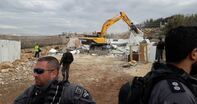
The Israeli occupation forces on Monday ordered the demolition of Palestinian homes, a sheep barn, a nature reserve, and a children's playground in al-Khalil.
Activist Rateb al-Jabour said that the Israeli forces handed the Palestinian citizens Ali Abu Aram and Samir al-Hamamda notices to demolish their homes.
Other demolition orders were issued against a sheep barn owned by Essa al-Hamamda, a nature reserve, and a children's playground.
Al-Jabour appealed to the concerned local and international human rights organizations to intervene and put an end to the Israeli daily violations in the Palestinian territories.
Israel in 2012 started a plan to demolish eight Palestinian villages in al-Khalil and forcibly transfer their residents, estimated at 1,500, in order to expand existing settlements built illegally on privately-owned Palestinian lands.
Activist Rateb al-Jabour said that the Israeli forces handed the Palestinian citizens Ali Abu Aram and Samir al-Hamamda notices to demolish their homes.
Other demolition orders were issued against a sheep barn owned by Essa al-Hamamda, a nature reserve, and a children's playground.
Al-Jabour appealed to the concerned local and international human rights organizations to intervene and put an end to the Israeli daily violations in the Palestinian territories.
Israel in 2012 started a plan to demolish eight Palestinian villages in al-Khalil and forcibly transfer their residents, estimated at 1,500, in order to expand existing settlements built illegally on privately-owned Palestinian lands.
